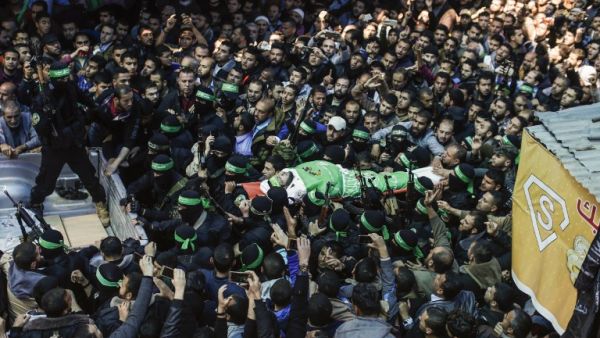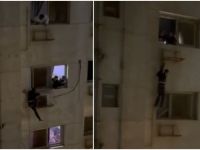The Hamas-run Ministry of Interior in the Gaza Strip declared “a week of repentance” to begin on Tuesday, calling on Palestinians collaborating with Israel to confess and turn themselves into intelligence authorities, amid a fierce security crackdown in the besieged coastal enclave in the wake of the killing of Hamas leader Mazen Fuqahaa.
The announcement came hours after a United Nations agency warned of the possibility that Gaza authorities could carry out “imminent executions,” after the Interior Ministry there announced Saturday that "severe measures will be taken against collaborators of the occupation within the coming hours and days."
Tuesday morning, the ministry unveiled one such measure, saying that between Tuesday April 4 and midnight on April 11, "collaborators who have fallen prey to the influence of the occupation and its intelligence services can turn themselves into Gaza intelligence services.”
The “collaborators can declare repentance,” the statement said, by contacting the "nearest person connected with Gaza security services."
The ministry assured that those surrendering would be "provided security and legal protection," and that "their cases would be undertaken in complete secrecy, separate from security service offices.”
Those who choose not to turn themselves in “will be reached by security services,” the statement ominously declared.
Hamas launched similar campaigns in the past, attempting to persuade purported collaborators with Israel to admit their crime and repent.
Hamas has yet to provide evidence to support its accusation that Israel was responsible for shooting and killing Fuqahaa in front of his home in Gaza City nearly two weeks ago. The attorney general in the small Palestinian territory has meanwhile issued a gag order banning the publication of any information about the ongoing investigation.
In a statement Monday night, the Office of the United Nations High Commissioner for Human Rights in the occupied Palestinian territory expressed “its alarm at the possibility of imminent executions in Gaza,” stressing that the act would violate both domestic and international law.
Under Palestinian law, willful, premeditated murder and treason as well as collaboration with the enemy -- usually Israel -- are punishable by death. However, all death sentences must be ratified by the Palestinian president before they can be carried out.
Despite this, Hamas' de facto administration in Gaza has carried out executions periodically -- including against several alleged collaborators -- without receiving approval from Palestinian Authority President Mahmoud Abbas since 2010.
“Based on monitoring carried out in Gaza, OHCHR OPT does not believe that capital trials meet the stringent standards required under international law, which stipulate that capital punishment may be only carried out after a final judgment rendered by a competent court following a legal process that guaranteed all possible safeguards to ensure a fair trial,” the UN agency’s statement said.
The agency noted that the “severe measures” foreseen by Gaza authorities were only “the latest in a series of steps adopted by the Gaza authorities in response to Fuqahaa's killing, which have resulted in widespread and significant infringements of the rights of hundreds of Palestinians from Gaza to freedom of movement, freedom of expression, health and work.”
Since the alleged assassination, residents of the besieged coastal enclave remained under a Hamas-imposed lockdown, with authorities denying passage to Israel until further notice amid the manhunt -- with the exception of certain cases.
Erez is the only land crossing between Gaza and Israel for for the movement of people. While travel is heavily restricted by Israeli authorities as part of a crippling blockade on the coastal enclave in place since 2007, the Hamas-implemented closure came as a rare measure.
The Palestinian NGOs Network condemned the lockdown on Thursday, stating that "the imposed restrictions violate a wide range of fundamental rights protected by Palestinian laws."
According to Israeli human rights group Gisha, which focuses on defending freedom of movement for Palestinians, especially in Gaza, between March 26 and 28, the daily average number of exits via Erez was 73, less than a quarter of the daily average number of exits in February. The daily average number of entrances to Gaza was 151, slightly more than half of the daily average during February.
“Even the few lucky residents of Gaza to whom Israel has granted travel permits have been denied movement out of the Strip this week," the group said in a statement after the lockdown was initiated. "Among those affected are medical patients in need of life-saving treatment; traders and businesspeople; Palestinians seeking access to consular services, including visa applicants with scheduled interviews; and people who have received permits to visit family under humanitarian circumstances.”
The group said that “security concerns do not give any actor free reign to violate human rights. Freedom of movement is a fundamental human right, and is a basic precondition for the fulfillment of other rights, such as the right to health, to livelihood, and to family life.”








